[English] 日本語
 Yorodumi
Yorodumi- PDB-2kct: Solution nmr structure of the ob-fold domain of heme chaperone cc... -
+ Open data
Open data
- Basic information
Basic information
| Entry | Database: PDB / ID: 2kct | ||||||
|---|---|---|---|---|---|---|---|
| Title | Solution nmr structure of the ob-fold domain of heme chaperone ccme from desulfovibrio vulgaris. northeast structural genomics target dvr115g. | ||||||
 Components Components | Cytochrome c-type biogenesis protein CcmE | ||||||
 Keywords Keywords |  CHAPERONE / solution NMR structure / heme chaperone / cytochrome c biogenesis / OB-fold domain / NESG / PSI-2 / CHAPERONE / solution NMR structure / heme chaperone / cytochrome c biogenesis / OB-fold domain / NESG / PSI-2 /  Structural Genomics / Structural Genomics /  Protein Structure Initiative / Northeast Structural Genomics Consortium / Protein Structure Initiative / Northeast Structural Genomics Consortium /  BIOSYNTHETIC PROTEIN BIOSYNTHETIC PROTEIN | ||||||
| Function / homology |  Function and homology information Function and homology informationprotein-heme linkage / cytochrome complex assembly / membrane => GO:0016020 /  heme binding / heme binding /  plasma membrane plasma membraneSimilarity search - Function | ||||||
| Biological species |   Desulfovibrio vulgaris str. Hildenborough (bacteria) Desulfovibrio vulgaris str. Hildenborough (bacteria) | ||||||
| Method |  SOLUTION NMR / SOLUTION NMR /  simulated annealing simulated annealing | ||||||
| Model details | lowest energy, model 1 | ||||||
 Authors Authors | Aramini, J.M. / Rossi, P. / Lee, H. / Lemak, A. / Wang, H. / Foote, E.L. / Jiang, M. / Xiao, R. / Nair, R. / Swapna, G.V.T. ...Aramini, J.M. / Rossi, P. / Lee, H. / Lemak, A. / Wang, H. / Foote, E.L. / Jiang, M. / Xiao, R. / Nair, R. / Swapna, G.V.T. / Acton, T.B. / Rost, B. / Everett, J.K. / Montelione, G.T. / Northeast Structural Genomics Consortium (NESG) | ||||||
 Citation Citation |  Journal: To be Published Journal: To be PublishedTitle: Solution nmr structure of the ob-fold domain of heme chaperone ccme from desulfovibrio vulgaris. northeast structural genomics target dvr115g. Authors: Aramini, J.M. / Rossi, P. / Lee, H. / Lemak, A. / Wang, H. / Foote, E.L. / Jiang, M. / Xiao, R. / Nair, R. / Swapna, G.V.T. / Acton, T.B. / Rost, B. / Everett, J.K. / Montelione, G.T. | ||||||
| History |
|
- Structure visualization
Structure visualization
| Structure viewer | Molecule:  Molmil Molmil Jmol/JSmol Jmol/JSmol |
|---|
- Downloads & links
Downloads & links
- Download
Download
| PDBx/mmCIF format |  2kct.cif.gz 2kct.cif.gz | 527.2 KB | Display |  PDBx/mmCIF format PDBx/mmCIF format |
|---|---|---|---|---|
| PDB format |  pdb2kct.ent.gz pdb2kct.ent.gz | 439.6 KB | Display |  PDB format PDB format |
| PDBx/mmJSON format |  2kct.json.gz 2kct.json.gz | Tree view |  PDBx/mmJSON format PDBx/mmJSON format | |
| Others |  Other downloads Other downloads |
-Validation report
| Arichive directory |  https://data.pdbj.org/pub/pdb/validation_reports/kc/2kct https://data.pdbj.org/pub/pdb/validation_reports/kc/2kct ftp://data.pdbj.org/pub/pdb/validation_reports/kc/2kct ftp://data.pdbj.org/pub/pdb/validation_reports/kc/2kct | HTTPS FTP |
|---|
-Related structure data
| Similar structure data | |
|---|---|
| Other databases |
- Links
Links
- Assembly
Assembly
| Deposited unit | 
| |||||||||
|---|---|---|---|---|---|---|---|---|---|---|
| 1 |
| |||||||||
| NMR ensembles |
|
- Components
Components
| #1: Protein | Mass: 10375.898 Da / Num. of mol.: 1 Source method: isolated from a genetically manipulated source Source: (gene. exp.)   Desulfovibrio vulgaris str. Hildenborough (bacteria) Desulfovibrio vulgaris str. Hildenborough (bacteria)Gene: ccmE, DVU_1051 / Plasmid: DvR115G-21.2 / Production host:   Escherichia coli (E. coli) / Strain (production host): BL21(DE3)MGK / References: UniProt: Q72D78 Escherichia coli (E. coli) / Strain (production host): BL21(DE3)MGK / References: UniProt: Q72D78 |
|---|
-Experimental details
-Experiment
| Experiment | Method:  SOLUTION NMR SOLUTION NMR | ||||||||||||||||||||||||||||||||||||||||||||||||||||||||||||||||||||||||||||||||
|---|---|---|---|---|---|---|---|---|---|---|---|---|---|---|---|---|---|---|---|---|---|---|---|---|---|---|---|---|---|---|---|---|---|---|---|---|---|---|---|---|---|---|---|---|---|---|---|---|---|---|---|---|---|---|---|---|---|---|---|---|---|---|---|---|---|---|---|---|---|---|---|---|---|---|---|---|---|---|---|---|---|
| NMR experiment |
| ||||||||||||||||||||||||||||||||||||||||||||||||||||||||||||||||||||||||||||||||
| NMR details | Text: THE PROTEIN IS MONOMERIC BY GEL FILTRATION CHROMATOGRAPHY, STATIC LIGHT SCATTERING AND 15N T1/T2 RELAXATION. THE STRUCTURE WAS DETERMINED USING TRIPLE RESONANCE NMR SPECTROSCOPY. AUTOMATED ...Text: THE PROTEIN IS MONOMERIC BY GEL FILTRATION CHROMATOGRAPHY, STATIC LIGHT SCATTERING AND 15N T1/T2 RELAXATION. THE STRUCTURE WAS DETERMINED USING TRIPLE RESONANCE NMR SPECTROSCOPY. AUTOMATED BACKBONE ASSIGNMENTS WERE MADE USING AUTOASSIGN AND PINE, AND THE SIDE CHAIN ASSIGNMENTS WERE COMPLETED MANUALLY. AUTOMATIC NOESY ASSIGNMENTS WERE DETERMINED USING CYANA 3.0. BACKBONE (PHI/ PSI) DIHEDRAL ANGLE CONSTRAINTS WERE OBTAINED FROM TALOS. ROTAMER STATES OF SPECIFIC ORDERED RESIDUES WERE CONSTRAINED IN THE FINAL STAGE OF THE STRUCTURE REFINEMENT BASED ON PROCHECK. COMPLETENESS OF NMR ASSIGNMENTS (EXCLUDING C- TERMINAL HHHHHH): BACKBONE, 98.6%, SIDE CHAIN, 97.2%, AROMATICS, 100%, STEREOSPECIFIC METHYL, 100%, STEREOSPECIFIC SIDE CHAIN NH2: 100%. FINAL STRUCTURE QUALITY FACTORS (FOR RESIDUES 43 TO 130, PSVS 1.3), WHERE ORDERED RESIDUES [S(PHI) + S(PSI) > 1.8] COMPRISE: 52-67,70-79,86-112,115-127: (A) RMSD (ORDERED RESIDUES): BB, 0.5, HEAVY ATOM, 0.9. (B) RAMACHANDRAN STATISTICS FOR ORDERED RESIDUES: MOST FAVORED, 93.9%, ADDITIONALLY ALLOWED, 6.1%, GENEROUSLY ALLOWED, 0.0%, DISALLOWED, 0.0%. (C) PROCHECK SCORES FOR ORDERED RESIDUES (RAW/Z-): PHI-PSI, -0.62/-2.12, ALL, -0.43/-2.54. (D) MOLPROBITY CLASH SCORE (RAW/Z-): 10.87/-0.34 (E) RPF SCORES FOR GOODNESS OF FIT TO NOESY DATA (RESIDUES 43-130): RECALL, 0.984, PRECISION, 0.915, F-MEASURE, 0.948, DP-SCORE, 0.795. (F) NUMBER OF CLOSE CONTACTS PER 20 MODELS: 4. (G) AGREEMENT WITH RESIDUAL DIPOLAR COUPLINGS (20 MODELS): CORRELATION COEFFICIENT (R): 0.995 (0.001); Q RMS: 0.096 (0.011). THE C- TERMINAL HIS TAG RESIDUES OF THE PROTEIN (HHHHHH) WERE NOT INCLUDED IN THE STRUCTURE CALCULATIONS AND HAVE BEEN OMITTED FROM THIS DEPOSITION. COORDINATES FOR THE FOLLOWING RESIDUES ARE NOT WELL DETERMINED [S(PHI) + S(PSI) < 1.8]: 43-51,68-69, 80-85,113-114,128-130. |
- Sample preparation
Sample preparation
| Details |
| ||||||||||||||||||||||||||||||||||||||||||||||||||||||||||||||||||||
|---|---|---|---|---|---|---|---|---|---|---|---|---|---|---|---|---|---|---|---|---|---|---|---|---|---|---|---|---|---|---|---|---|---|---|---|---|---|---|---|---|---|---|---|---|---|---|---|---|---|---|---|---|---|---|---|---|---|---|---|---|---|---|---|---|---|---|---|---|---|
| Sample |
| ||||||||||||||||||||||||||||||||||||||||||||||||||||||||||||||||||||
| Sample conditions | Ionic strength: 0.2 / pH: 4.5 / Pressure: AMBIENT / Temperature: 298 K |
-NMR measurement
| NMR spectrometer |
|
|---|
- Processing
Processing
| NMR software |
| ||||||||||||||||||||||||||||||||||||||||||||||||||||
|---|---|---|---|---|---|---|---|---|---|---|---|---|---|---|---|---|---|---|---|---|---|---|---|---|---|---|---|---|---|---|---|---|---|---|---|---|---|---|---|---|---|---|---|---|---|---|---|---|---|---|---|---|---|
| Refinement | Method:  simulated annealing / Software ordinal: 1 simulated annealing / Software ordinal: 1 Details: THE FINAL STRUCTURES ARE BASED ON A TOTAL OF 1384 CONFORMATIONALLY-RESTRICTING NOE-DERIVED DISTANCE CONSTRAINTS AND 79 DIHEDRAL ANGLE CONSTRAINTS; 0 HYDROGEN BOND CONSTRAINTS (16.8 ...Details: THE FINAL STRUCTURES ARE BASED ON A TOTAL OF 1384 CONFORMATIONALLY-RESTRICTING NOE-DERIVED DISTANCE CONSTRAINTS AND 79 DIHEDRAL ANGLE CONSTRAINTS; 0 HYDROGEN BOND CONSTRAINTS (16.8 CONSTRAINTS PER RESIDUE, 6.0 LONG RANGE CONSTRAINTS PER RESIDUE, COMPUTED FOR RESIDUES 43 TO 130 BY PSVS 1.3). IN ADDITION, 49 RESOLVED N-H RESIDUAL DIPOLAR COUPLINGS FOR ORDERED RESIDUES WERE INCLUDED IN ALL STRUCTURE CALCULATIONS. STRUCTURE DETERMINATION WAS PERFORMED ITERATIVELY USING CYANA 3.0. THE 20 STRUCTURES OUT OF 100 WITH THE LOWEST TARGET FUNCTION WERE FURTHER REFINED BY RESTRAINED MOLECULAR DYNAMICS/ENERGY MINIMIZATION IN EXPLICIT WATER (CNS) WITH PARAM19. | ||||||||||||||||||||||||||||||||||||||||||||||||||||
| NMR constraints | NOE constraints total: 1384 / NOE intraresidue total count: 344 / NOE long range total count: 525 / NOE medium range total count: 125 / NOE sequential total count: 390 / Protein chi angle constraints total count: 2 / Protein other angle constraints total count: 2 / Protein phi angle constraints total count: 37 / Protein psi angle constraints total count: 38 | ||||||||||||||||||||||||||||||||||||||||||||||||||||
| NMR ensemble | Conformer selection criteria: structures with the lowest energy Conformers calculated total number: 100 / Conformers submitted total number: 20 | ||||||||||||||||||||||||||||||||||||||||||||||||||||
| NMR ensemble rms | Distance rms dev: 0.01 Å |
 Movie
Movie Controller
Controller


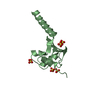
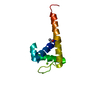
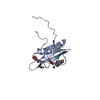
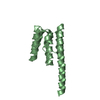
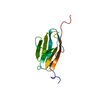

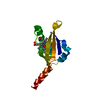
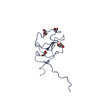
 PDBj
PDBj
